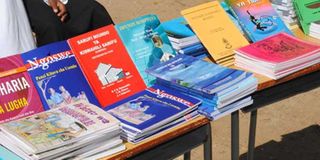EDITORIAL: Schoolbooks shortage: Find, fix the gremlin

What you need to know:
Oddly enough, the shortage is confined to pupils in the fourth year of their basic education – and that the problem is confined to government-owned primary schools.
Nearly three months after primary schools opened their doors to pupils inJanuary, it’s come to light that there’s a shortage of school teaching/learning books for Standard-IV pupils in government-run schools in Tanzania.
Oddly enough, the shortage is confined to pupils in the fourth year of their basic education – and that the problem is confined to government-owned primary schools.
The corollary to this is that school classes (other than the fourth grade) aren’t affected by the shortage… And, perhaps more alarming is that the shortage affects only government-managed schools, NOT private sector-operated schools.
We’re further told that teachers in the affected government schools have been directed by higher authorities to borrow Grade-IV books from neighbouring English-medium private schools, translate them into ki-Swahili – and then use the translated versions in teaching their (government school) pupils!
Generally, schoolbooks (also known as ‘course-books’ or ‘textbooks’) are for all practical purposes manuals of instruction giving information on a branch of study – and are usually produced for use in schools according to the demands of educational institutions. That being the case, for school pupils to experience a shortage of textbooks for any appreciable period of time is like smallholders routinely going to their farms without the requisite farming implements, such as hoes!
The challenge of provision of schoolbooks
Indeed, shortages of school books aren’t unheard of the world over. As Mr Roger Seguin of the ‘Division of Educational Sciences, Contents and Methods of Education’ at the UN Educational, Scientific and Cultural Organization (Unesco) noted in December 1989 (vide WS-24>): “the problem which many countries still face today is that of ensuring the provision of schoolbooks to their educational system.
“This is an undertaking which demands considerable resources – given the complexity of the different operations involved in the production and distribution of schoolbooks...”
Fair enough… But, that was a generation ago – and things should surely have improved? Then again, what’s more than puzzling is the fact that the countrywide schoolbooks shortage in Tanzania is mostly plaguing Grade-IV pupils – and only pupils in government primary schools, at that!
Considering that other primary school Grades – and, indeed, private sector-run schools – don’t largely face such shortages is arguably testimony that there’s really no shortage of quality books at stockists-cum-suppliers… Or is there?
Reportedly, the requisite schoolbooks for Grade-III pupils last year were late a-coming – a situation compounded by a more-or-less similar problem for Grade-IV pupils this year. That makes it doubly-confounding for the very same pupils who were in Grade-III last year! It also makes it near-impossible for both teachers and students to meet their classroom (teaching/learning) obligations.
Besides: how can such pupils be expected to perform well in the coming exams – having laid no proper academic foundation for lack of schoolbooks, pray?
Top officials at the Education ministry were evasive in responding to questions on the matter from The Citizen’s sister paper Mwananchi earlier this week, seeking clarification. This is not fair to the pupils, their teachers, the crucial Education sector and Tanzanians at large. Someone must stand up and be counted on this.




